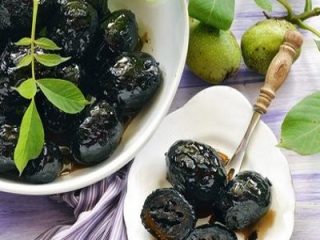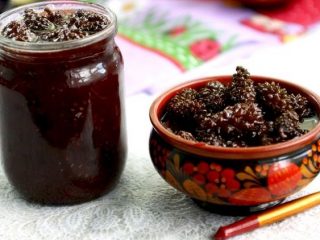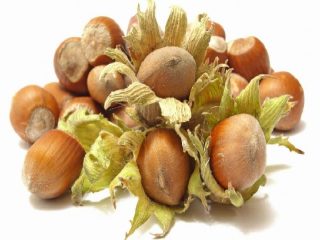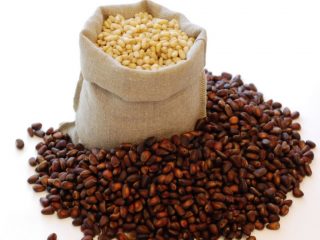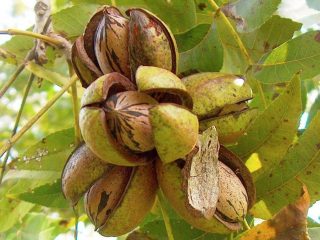Content
- 1 Are there any benefits to roasted sunflower seeds?
- 2 What vitamins are in roasted sunflower seeds?
- 3 Benefits of roasted sunflower seeds for the body
- 4 Why are fried sunflower seeds harmful?
- 5 Calorie content of roasted sunflower seeds
- 6 Contraindications for roasted sunflower seeds
- 7 Rules for eating roasted sunflower seeds
- 8 Conclusion
The benefits and harms of roasted sunflower seeds is a topic that is often discussed, both among doctors and nutritionists. No one denies the value of the chemical composition of this product, but we must not forget about its high calorie content and numerous contraindications.
Are there any benefits to roasted sunflower seeds?
Small sunflower seeds are a valuable source of vitamins and micronutrients. The benefits and harms of fried sunflower kernels are determined primarily by their composition.
It contains many macro- and micronutrients, namely:
- ascorbic and folic acid;
- phosphorus;
- potassium;
- sodium;
- calcium;
- selenium;
- iron;
- magnesium;
- manganese;
- Omega 3 and 6 fatty acids.
Moderate consumption of sunflower kernels has a positive effect on the functioning of most systems of the human body.
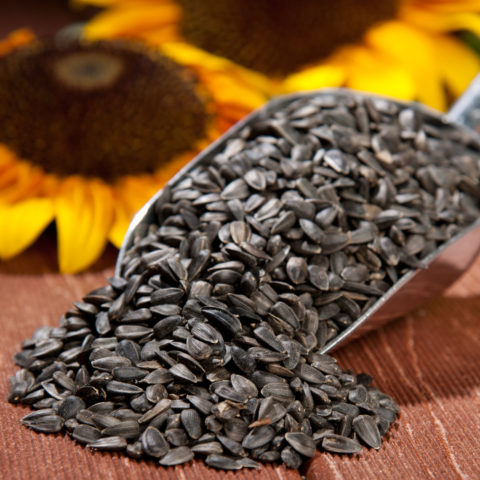
The seeds have a valuable chemical composition
The beneficial properties of roasted sunflower seeds include:
- Strengthening the walls of blood vessels.
- Reducing the level of “bad” cholesterol.
- Normalization of blood pressure.
- Positive effect on the functioning of the gastrointestinal tract.
- Improved peristalsis.
- Reducing the risk of developing cancer.
- Prevention of arthritis.
- Improved vision.
Eating a small amount of sunflower seeds can cleanse the intestines, normalize stools and speed up metabolism, so nutritionists recommend including this product in the menu (no more than 30 g per day) even for those who want to lose weight.
Sunflower kernels have a low glycemic index (25 units), so they can be included in the diet of even patients with diabetes. In addition, the magnesium contained in them can lower blood glucose levels.
What vitamins are in roasted sunflower seeds?
Roasted sunflower kernels contain a whole range of important vitamins:
- Tocopherol (vitamin E) actively participates in the production of collagen, increases skin firmness and elasticity. It is a strong antioxidant that can fight free radicals and prevent the formation of malignant and benign tumors. Tocopherol slows down the aging process and is especially useful for older people.
- Retinol (vitamin A) is responsible for cell regeneration, strengthens the immune system, and affects visual acuity. It is involved in the process of protein synthesis, strengthens muscle and bone tissue.
- Vitamin D - an important component of the children's diet. The calcium contained in the seeds is necessary for children during the period of growth and strengthening of bone tissue.Advice! The most useful are sprouted seeds.
- Thiamine (vitamin B1) has a positive effect on memory and brain function, regulates mood and emotional background, slows down the aging process, and reduces the negative effects of alcohol and tobacco on the body.
- Cobalamin (vitamin B12) is involved in the formation of DNA and the nervous system, regulates metabolism, prevents anemia, improves appetite and protects the gastrointestinal mucosa.
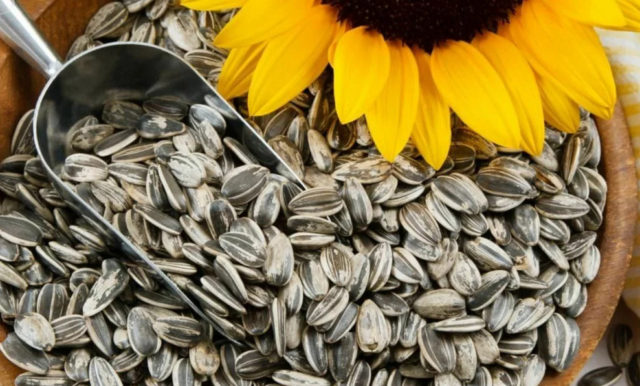
Beneficial vitamin D is contained in seeds even in greater quantities than in cod liver.
Benefits of roasted sunflower seeds for the body
The seeds are beneficial for both men and women. The main condition is moderate use, otherwise the benefits can easily turn into harm.
Benefits of roasted sunflower seeds for women
Fatty acids contained in sunflower kernels have a beneficial effect on appearance, improving the condition of hair and skin. Vitamin E, which this product is so rich in, also plays an important role here.
Sunflower kernels are also useful for pregnant women, as they contain folic acid, which is responsible for the normal development of the fetus. But during breastfeeding you should avoid this product, as it is a strong allergen.
Benefits of roasted sunflower seeds for men
The main benefit for men lies in the nutrient selenium, which is part of the seeds. This microelement has a positive effect on male reproductive function, improves blood circulation and improves the quality of intimate life.
The seeds are good for vision. They also stimulate the growth of muscle mass, so they are often included in the diet of athletes and sportsmen, not forgetting their moderate consumption.
Why are fried sunflower seeds harmful?
In addition to the positive properties of fried sunflower seeds, it is worth mentioning the possible harm that their uncontrolled consumption can cause.
For ulcers and gastritis, the use of sunflower kernels is not recommended due to their irritating effect on the walls of the stomach. During the period of remission for gastritis, doctors allow the introduction of small portions of seeds into the diet, provided they are lightly roasted.
Roasted seeds are strictly prohibited for pancreatitis and gout. In the latter case, they can provoke increased pain. We must not forget about the high calorie content of this product, so overweight people should exclude fried sunflower kernels from their daily menu.
The habit of “husking” seeds provokes the development of caries and negatively affects the condition of tooth enamel. Sunflower kernels are a no-no for vocalists as they irritate the vocal cords. Uncontrolled consumption can cause heaviness in the stomach, heartburn and flatulence.
Calorie content of roasted sunflower seeds
Fried sunflower kernels are a high-calorie product. A handful of seeds weighing 100 g contains almost 600 kcal. It is for this reason that they are prohibited for obesity and excess weight.

Calorie content of raw seeds – 510 kcal, fried – almost 600 kcal
However, a small volume of 20-30 g of roasted seeds per day can stimulate peristalsis, cleanse the intestines and improve metabolism. Therefore, during the diet, this product can be used only in the smallest doses and always taking into account their calorie content.
Contraindications for roasted sunflower seeds
The main contraindications to the introduction of this product into the diet are:
- individual intolerance;
- diseases of the biliary tract;
- acute stages of gastritis;
- stomach ulcer;
- gout;
- colitis;
- breast-feeding;
- obesity.
For children, the main contraindication is age under three years.
Rules for eating roasted sunflower seeds
Most nutrition experts recommend consuming sunflower kernels not fried, but dried. The roasting process reduces the amount of beneficial nutrients in the product and increases the calorie content of the seeds (when using oil). Heat treatment provokes the formation of harmful carcinogens in the seeds.
However, if it is difficult to deny yourself such a delicacy, then you should follow a number of rules that will allow you to maintain the maximum benefit of the product, while minimizing its possible harm:
- Refuse to use any oil (vegetable, butter).
- Reduce frying time to minimum.
- Do not use salt during cooking.
You can fry the seeds not only in a frying pan, but also in the oven or microwave. In the first case, washed and dried raw sunflower kernels are poured onto a baking sheet, spread into a layer no more than 2 cm thick and baked at a temperature of 150-180 ° C for 20-25 minutes, not forgetting to stir periodically. After the seeds are removed from the oven, they are covered with a towel for 5-10 minutes, under which they “reach”.
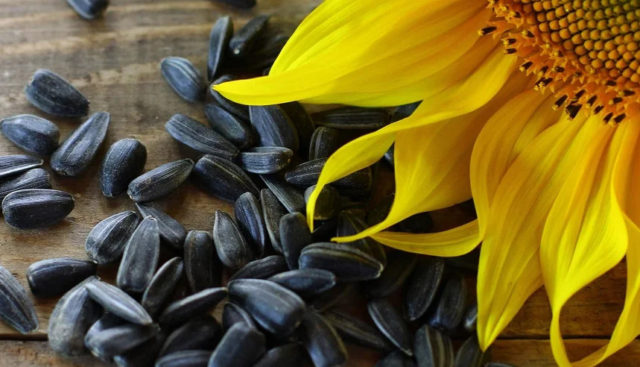
Seeds can be fried not only in a frying pan, but also in the oven
Cooking in a microwave oven includes the following operations:
- Washed and dried sunflower kernels are placed in a bowl and placed in the microwave for 3 minutes at a set power of 800 W.
- Take out the container with the product and mix well.
- Place it back into the microwave oven for 2 minutes at the same power.
- If after this the seeds are not ready, you can “bake” them again for a minute.
The benefits of the product depend on the correct choice of raw materials. When buying by weight, you need to pay attention to color, smell and size. You should be wary:
- bitter or musty odor;
- gray plaque;
- too large or small (the most delicious and healthy seeds are medium-sized).
The safe consumption rate for roasted seeds is 40-50 g per day.
Conclusion
The benefits and harms of fried sunflower seeds are determined not only by the chemical composition, but also by the general condition of the body. Consuming this product can be beneficial, but only in small portions and in the absence of contraindications.
